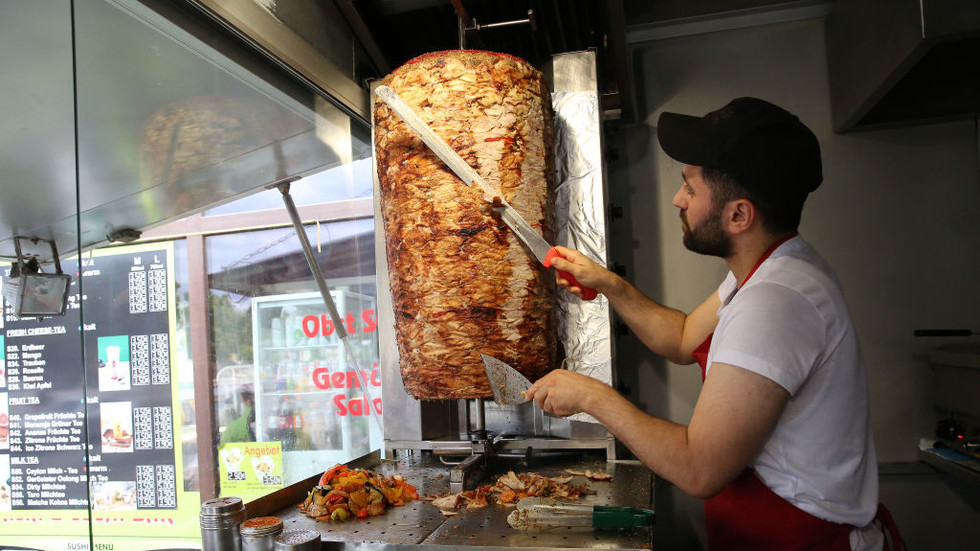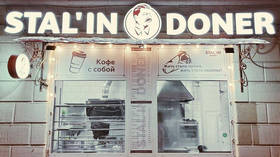
Berlin must not allow the humble doner to “become a luxury item,” the Left party has demanded

An employee prepares a customer’s order at Mustafas Gemuse Kebap in Berlin, Germany, July 6, 2022 © Getty Images / Adam Berry
Germany’s Left party has suggested that the state subsidize doner kebabs to the tune of almost €4 billion per year. Inflation and rising energy costs have nearly doubled the price of the Turkish snack staple in recent years.
In a policy paper seen by German tabloid Bild and reported on Sunday, the Left proposed capping the price of a doner kebab at €4.90 or €2.50 for students, young people, and those on low incomes. With the cost of a kebab now averaging €7.90, the government would pick up the rest of the tab, the paper states.
“A kebab price cap helps consumers and kebab shop owners. If the state adds three euros for every kebab, the kebab price cap would cost almost four billion,” the party wrote in the paper, explaining that around 1.3 billion kebabs are eaten in Germany every year.
“When young people demand: Olaf, make the kebab cheaper, it’s not an internet joke, but a serious cry for help,” Left party executive Kathi Gebel told Bild, referring to German Chancellor Olaf Scholz. “The state must intervene so that food does not become a luxury item.”

Read more
Introduced to Germany by Turkish immigrants in the 1970s, the doner kebab has become the nation’s favorite fast food. However, while the Left describes the sauce-laden lamb sandwich as a daily staple for some families, most doctors and nutritionists would recommend they be consumed only as an occasional treat. A 2009 study from Scotland found that the average doner kebab contained 98% of an adult’s recommended daily salt intake and 150% of the recommended saturated fat intake.
For years, the price of a doner kebab hovered around €4 in Germany. However, the rising energy costs and inflation that followed Scholz’s decision to embargo Russian fossil fuels have forced vendors to up their prices.
“We have been forced to push up the price due to exploding rent, energy and food prices,” a kebab stand operator in Berlin told The Guardian. “People talk to us all the time about ‘Donerflation’, as if we were diddling them, but it’s completely out of our control.”
Many Germans blame Scholz for depriving them of cheap kebabs. “I pay eight euros for a doner,” a protester shouted at Scholz in 2022, before imploring the chancellor to “talk to [Russian President Vladimir] Putin, I would like to pay four euros for a doner, please.”

Read more
“It’s quite striking that everywhere I go, mainly from young people, I’m asked whether there shouldn’t be a price cap for the doner,” Scholz remarked in a recent Instagram video. However, Scholz has ruled out such a move, instead praising the “good work of the European Central Bank” in supposedly getting inflation under control.
Kebab fans are not the only Germans suffering under Scholz. Last month, Germany’s largest steelmaker, Thyssenkrupp, announced “a substantial reduction in production” at its Duisburg facility, firing 13,000 employees. The company blamed “high energy costs and tight emission reduction regulations” for its decline in productivity.
Less than a week after Thyssenkrupp announced its cutbacks, the International Monetary Fund revised Germany’s economic growth outlook down from 0.5% to 0.2% this year. According to the figures, Germany is expected to have the weakest growth of any state belonging to the G7 group of industrialized countries in 2024.




